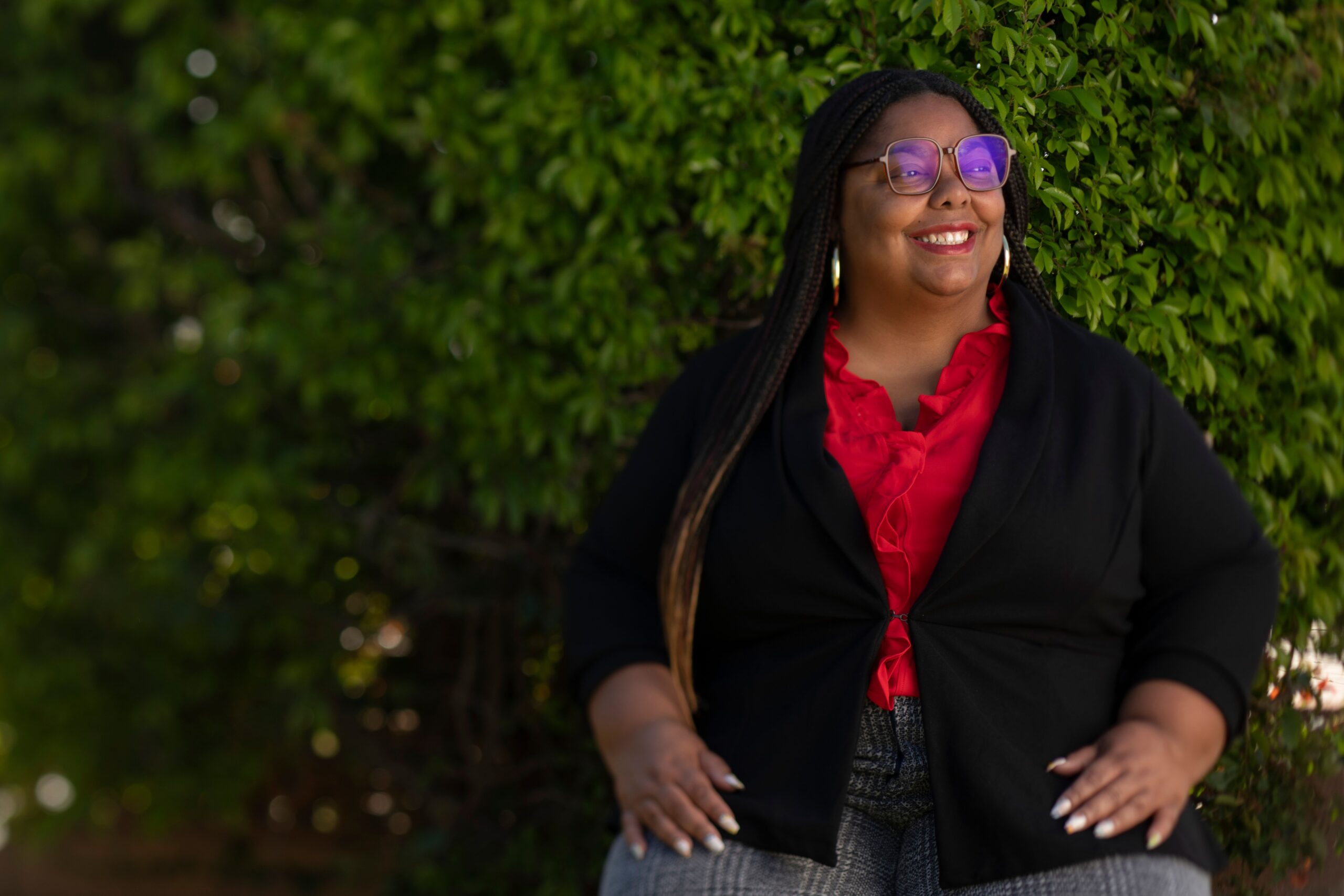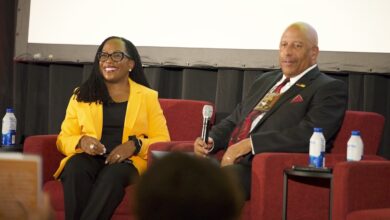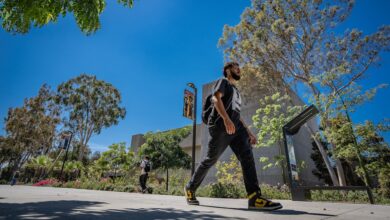
For CSUDH alumna Kristin McGuire, executive director/CEO of political advocacy group Young Invincibles, the desire to help change society for the better is more than a passing fancy. “It’s in my family’s DNA,” she says.
McGuire’s great-grandfather attempted to build the first Black-owned store in his Southern community–until the Ku Klux Klan burned it down. Her grandmother was the first Black radio DJ in their area, and her mother was one of the first Black students to integrate her Alabama school system, at the age of seven years old.
“You hear the story of Ruby Bridges, but there were a lot of Ruby Bridges out there, and my mom was one of those,” says McGuire. “To this day in her former Alabama community, they still recognize her as the person who integrated the school systems there.”
Add in the fact that McGuire’s younger brother, Rex Richardson, was just elected as the first Black mayor of Long Beach, Calif., and you understand why she says, “Community responsibility runs deep in our family.”
McGuire’s contributions to the community will be recognized on April 22, when she is honored as a ‘Guardian of Democracy’ at the Southern California Public Radio 2023 Gala at Paramount Studios. She will be joined in this honor by Adam Schiff of the January 6th Committee and Miguel Santana, president/CEO of the Weingart Foundation.
McGuire is the first Black executive director of Young Invincibles, the nation’s largest policy and advocacy organization for young adults. “We work on higher education, health care, workforce, finance, and civic engagement, all with the mission to amplify young adult voices and create economic opportunity for young people,” she explains.
“We do a lot of outreach and education on the issues we work on,” she continues. “We identify a problem that is keeping young people from being able to reach economic opportunities. We also identify a solution, and then we advocate for that solution.”
One of the group’s primary campaigns for the past decade has been the fight to cancel student debt. The group led a large rally on the steps of the Supreme Court in Washington, DC, and McGuire is pleased that President Joe Biden has been receptive to their ideas. The battle is still unresolved, however, because, “We’ve gotten good in this country at turning the victims into the enemies,” she says.
Young Invincibles was also instrumental in getting the Affordable Care Act to add a provision enabling people to stay on their parents’ health insurance until they are 26 years old. The group is based in Washington, DC, but has offices in Los Angeles, Sacramento, New York, Chicago, and elsewhere.
McGuire was one of three children born to her parents, who divorced when she was 5 years old. The children were then raised by their mother, who worked as a welder at General Motors in the Midwest. “That’s a core memory for me, having a working class, blue collar momma,” she says. “She used to tell us things like, ‘You have to get paid for working with your mind, because your body will give out on you. She really embedded in us the value of education.”
After moving to California with her family and completing high school, McGuire had planned to attend an HBCU. She changed her mind after visiting the CSUDH campus while in the twelfth grade.
“There were people sitting there on blankets and reading books,” she recalls. “It just looked like college to me. It was close to home, but far enough away that I could feel like I got to grow up and get out of my mom’s house–but also close enough that when I needed to get home, I could.”
“Also, there was an affordability piece. We didn’t have $20,000 to pay in tuition. So I decided to attend an in-state college and really make the best of that opportunity. I liked that the class sizes were small, so I felt like I got to know my teachers.”
McGuire credits CSUDH with helping her realize her calling. She started as a psychology major, but soon began to feel drawn towards social justice work. She wanted to learn about the criminal justice system and how government worked, and ended up graduating with a BA in public administration.
While at CSUDH, McGuire was very active. She joined the Delta Sigma Theta Sorority, Inc., Pi Chi Chapter, where she is still a member and holds a regional leadership position. She was named CSUDH Homecoming Queen. McGuire even ran the student campaign for a new student union, a successful effort that led to the construction of the Loker Student Union that we have today. She walked the campus wearing a sandwich board, handed out campaign flyers, and even went door-to-door with her campaign.
“I didn’t quite realize that our student union was going to close and we would have to eat out of food trucks for two years!” she laughs. “But I’m really happy that the students that followed me have had such a wonderful quality place to call their own.”
McGuire sums up her CSUDH experience by saying, “It allowed me to grow up and learn more about myself. I learned how to make my advocacy and my beliefs work together. I was very passionate, but didn’t really have the appropriate outlet. I didn’t know how to channel that passion. I learned that at CSUDH.”
When she was first contacted about being named a Guardian of Democracy, McGuire thought it was a prank. It was only once she got a phone call from the director of National Public Radio that she realized it was real.
“It’s still a little surreal to me,” she says. “I think about the work that I’m doing, and that people have been following my career for all this time. I think about where I came from, a working class background, and now I’m going to be honored by a who’s who of Los Angeles society. And getting an award alongside the January 6th Committee? It’s really incredible.”
“The work that I do, I do it because I love it,” she adds. “I care about it. I feel so honored and blessed to be able to take care of my family by doing what I really love to do and what I’m passionate about. I wish that for everyone.”
“As a first-generation college student, it makes me happy that I am able to affect change that I can almost immediately see. I can point to students overcoming food insecurity and feel that I helped with that. Now, students who need Supplemental Nutrition Assistance Program (SNAP) benefits can get them, and I was personally responsible for those laws changing in California. I wrote the letters to the Food and Drug Administration advocating for SNAP benefits. That makes me feel incredibly proud.”








